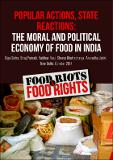| dc.description.abstract | Can popular mobilisation activate accountability for hunger? In 2012, a group of researchers set out to explore this question through field research in four countries: Bangladesh, India, Kenya and Mozambique. The research was framed in ideas about a contemporary ‘moral economy’ – which when breached, would lead people to mobilise – either in the form of riots, or as movements for the right to food, thus activating state responses.
This preliminary report is organised as follows:
Section 2 briefly lays out the political economy context of this time. Section 3 elaborates on the impacts and political economy of food price volatility (FPV) and inflation, drawing upon general Indian data and academic debates.
Having set the stage, Section 4 elaborates on the methods used in the study and the adaptation of methods to the Indian context. In Section 5 we place popular mobilisation in India in the context of the new social movements literature, to highlight how such mobilisation has been directed at the state. In particular, the features and mobilisation strategies of the Right to Food campaign are drawn out, to set the stage for the next two empirical sections that follow; the first one on popular mobilisation in Madhya Pradesh (Section 6) and the next on ration riots in West Bengal (Section 7).
In Section 8 we trace the impact that these mobilisations had at national and state levels, drawing upon interviews with policymakers and activists. Bringing these sections together in Section 9, we revisit the core themes of the research: food price inflation, moral economy, popular mobilisation and policy responses. In the final Section 10 we conclude with observations about what these findings imply for the potential of popular mobilisation to elicit accountability for hunger from the state. | en |

